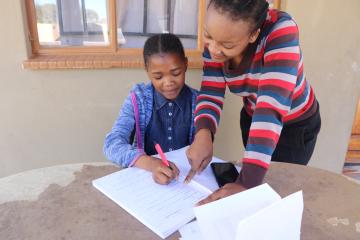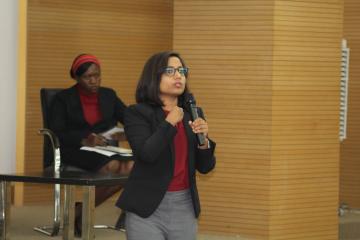
20 for 20: Promoting diversity in economics in LAC with current and former J-PAL staff

This is the second post of J-PAL’s 20 for 20: Partner Voices blog series, where we showcase stories of results and impact with our partners to celebrate our twentieth anniversary. Read on to learn more about how J-PAL Latin America and the Caribbean (LAC) staff and a J-PAL LAC alumna have contributed to promoting diversity in economics.
In this post, we speak with the co-founders of EconThaki, an organization created to improve diversity and inclusion in economics through information, training and mentoring in South America. Econthaki was launched by young Peruvian researchers, including Jostin Kitmang, J-PAL LAC Research Manager, and Selene Cueva Madrid, J-PAL LAC alumna.
Education opportunities tend to exhibit an unequal distribution in Latin America and the Caribbean. On average, access to higher education is four times more inequitable than access to secondary education. Despite Indigenous and Afro-descendant people accounting for approximately 30 percent of the population in the region, these groups still face significant barriers when attempting to access higher education institutions. For instance, in some Latin American countries, disadvantaged ethnic communities are 15 percent less likely to pursue tertiary education, and those residing far from educational institutions also encounter disparities in access.
In light of these and other challenges, calls to increase access to higher education have been growing. At J-PAL, we are committed to helping make the field of economics more diverse, equitable, and inclusive. J-PAL has taken action to help build a more diverse economics profession, including the creation of resources for people around the world to gain experience and funding to run randomized evaluations—like through the Africa, MENA, and India Scholars’ Programs, North America’s Economic Transformation Project, the online MicroMasters in Data, Economics, and Design of Policy (DEDP) and the accompanying Master’s program at MIT. Moreover, we are actively working to make training resources available in multiple languages, including self-paced online courses available in Spanish and Portuguese. However, there is still ample room to improve in this work. Consequently, when we encounter organizations dedicated to fostering greater diversity in economics, we strive to provide enhanced support.
Econthaki is an organization in Peru created to address some of these challenges through mentorship, founded by Jostin Kitmang, J-PAL LAC research manager, and Selene Cueva Madrid, J-PAL LAC alumna. We spoke with Jostin and Selene to learn more about Econthaki and their own journeys in the field of development economics.
How was Econthaki born?
In Peru, as in many other LAC countries, opportunities to do research are highly concentrated in a few universities and research centers, while talent can be found everywhere. If we don’t address ways to use that talent, we are losing human capital and potential contributions of those voices. Diversity is important for equity reasons, but also to have more perspectives and to improve science.
In this context, Econthaki emerged as a collaborative effort involving eight young Peruvian researchers (get to know us here) two years ago, and this year a team from Ecuador joined us. Each of our members has different paths and backgrounds but we are all committed to building an academia that is more diverse and inclusive for future generations.
What does Econthaki do to promote diversity?
We decided to start promoting equity in the access to information, training, and mentoring in economics, recognizing also that there exists an important intersectionality between gender, race, socioeconomic status, and other characteristics.
To promote access to information, we created a guide for undergraduates in economics to apply to PhD programs from Peru, adding to other guides to apply from Argentina, Mexico, and Brazil. We also started to highlight LAC researchers who are in a PhD program or completed one and represent the diversity of our region. For training and mentoring in economics, we launched the Ecomienza program.
Can you tell us about the Ecomienza program—a project supported by J-PAL LAC since its origin?
Ecomienza was born to alleviate the barriers faced by students from underrepresented backgrounds in starting a research career. This training and mentoring program offers econometric and programming tools, as well as personalized mentoring supported by PhD students, to undergraduate students or recent graduates interested in research.
We designed this program to provide early-stage training and guidance to students with a passion for research but limited previous training and networks. Since its launch in 2022, Ecomienza has trained students who have started their academic journey in the public sector or academia. This year, in partnership with BOWEN (an organization that promotes gender equality in economics in Bolivia) we trained thirty students from Peru, Ecuador, and Bolivia to promote diversity and inclusivity in the field of economics across the region. We are also proud to partner with J-PAL and IPA for the training and with several early-career researchers who have been mentors.
How do you envision the effects of EconThaki and other diversity initiatives on the LAC region in the following years?
Our vision is to continue creating a diverse and supportive network of researchers who are eager to contribute to the field with their ideas and improve diversity and inclusion in academia. We are convinced that our voice matters and that we can have an impact on people’s lives. To that end, we are convinced that we need more collaborative action to fight toward transformative changes in academia. Several diversity organizations, such as Bowen in Bolivia and ECONecta - EconomistAs and REPP in Brazil are doing incredible work along these lines.
How has J-PAL contributed to the development of your projects?
J-PAL LAC is a place where we have grown exponentially as researchers, but also have the opportunity to connect with people who have become great allies to EconThaki. With their support, we have provided training in impact evaluation and the use of gender lens in research to our mentees and we will continue working together to make LAC academia more diverse and inclusive for young researchers.
Do you have any suggestions for researchers and research centers in LAC who would like to work on expanding diversity in the field?
To make academia fairer and more inclusive for diverse individuals, we must redouble our individual and collective efforts. Here are our three recommendations:
- Broaden the screening candidates pool when hiring and be transparent with affirmative action. There is no trade-off between quality and diversity if selection processes are well-designed and implemented.
- Be the mentor that you would like to have. The power of words and motivating your teams can make a difference and empower underrepresented students to pursue their paths and realize their full potential.
- Support initiatives like EconThaki, BOWEN, or REPP in Brazil, and many others that are working to open academia for people from non-traditional backgrounds.
Building a more representative field of economics continues to be a priority for J-PAL; Econthaki is the perfect example of how our staff and alumni are a crucial part of that effort. Learn more about our work in DEI.




